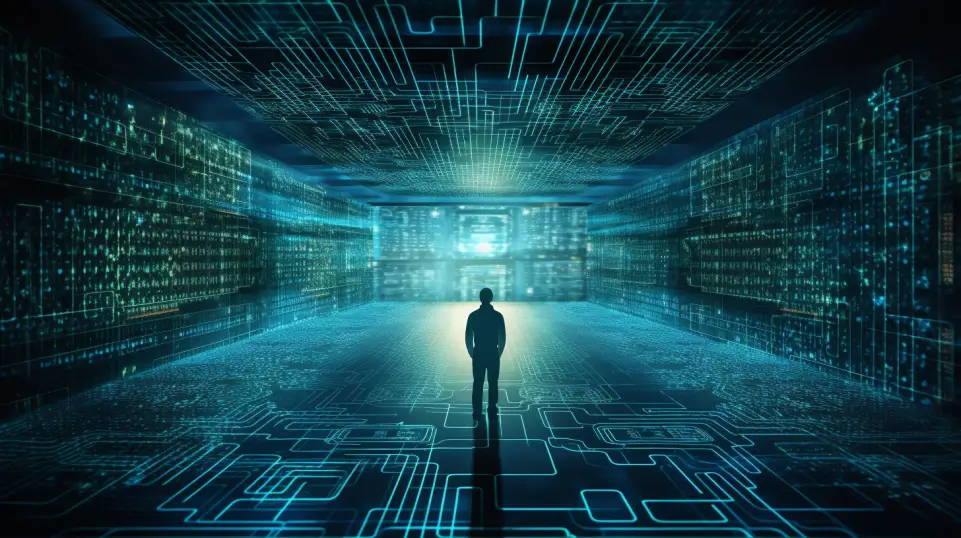The Ethics of VPN Usage – When is it Ethical to Use a VPN?
VPN technology has become indispensable in the interconnected world of 2023. Individuals and corporations alike are using VPNs to surf the web and conduct business in a more secure manner. But this tool is also used for illegal activities, bypassing geo-blocks, and other unethical activities.
I won’t discuss the legality and illegality of VPN usage in this article. I’ve already talked about that in another post, so check it out!
Instead, I’ll focus on the ethical question of VPN usage. When is it ethical to use it and when is it not? Do we throw the baby out with the bathwater or accept the compromises?
Let’s explore it!
Ethical Reasons for VPN Usage

There are clear legitimate and ethical reasons for using a VPN, such as:
Privacy Protection
A VPN’s foremost usage is to enhance your privacy and protect your private data from being accessed by unknown parties.
By creating a data tunnel between your internet connection and the VPN server, you can hide your:
- Browsing History
- IP Address and Location
- Streaming location
- What devices you’re using
No one has a de facto right to know these things about you, and it’s entirely ethical to want to hide them. After all, it’s your personal life and private data, and these aren’t public properties.
Privacy protection becomes even more important for individuals living under abusive regimes, journalists going to high-risk countries, or defectors.
Securing Personal Data on Public Networks
Virtual Private Networks can help secure your connection when using public Wi-Fi networks. The data tunnel I mentioned earlier is also encrypted, which means that all the transit data is indecipherable to threat actors.
Public Wi-Fi networks are infamous for the high risk of man-in-the-middle attacks or eavesdropping attacks. A hacker could “listen in” on your connection and find out private information like name, banking data, login credentials, and more.
By using a good VPN, you encrypt the normally unencrypted Wi-Fi connection so that threat actors can’t compromise it.
While not all identity theft breaches are in your control, Wi-Fi networks are. And VPNs are the best way to protect yourself against them.
This is also a clear case of ethical usage because you’re protecting yourself against potential attackers who want to steal from you.
Avoiding Geo-Restrictions
This one is a bit of a grey area. Let me explain:
- Bypassing restrictions imposed by an authoritarian government
Using a VPN to bypass state-imposed restrictions when you live under an abusive regime is arguably an ethical usage of VPNs. In my view, it falls under the “self-protection” prerogative.
No one should assume or justify non-action when your rights are taken away one by one, and as such, VPNs are a tool for liberation.
- Bypassing streaming service geo-restrictions
This is the gray area I mentioned earlier. In most cases, geo-blocks on streaming platforms exist due to licensing deals, copyright laws, regulatory restrictions, and other legitimate business or legal reasons.
When you use a VPN to bypass these restrictions, you’re technically violating the streaming service’s Terms of Service and circumventing the frameworks they’re required to follow.
Is it illegal? In the vast majority of jurisdictions, no—it’s not against the law to use a VPN to access geo-restricted content.
However, if the streaming provider detects it, they have every right to suspend or terminate your account, and they’d be within their rights to do so.
As for whether it’s unethical—that’s more complex. In my view, it only crosses an ethical line if you’re breaching copyright laws.
It’s similar to downloading pirated content via P2P networks: legality and ethics don’t always align, but violating creators’ rights is where most would agree the line is crossed.
Unethical Practices with VPN Usage

VPNs, just like any other technology, can be misused and utilized for unethical and/or illegal activities. These may include:
- Performing cyberattacks
- Engaging in online piracy
- Doxxing people
- Leaking sensitive data belonging to other people
A VPN will hide your traces and anonymize you, effectively helping you escape the consequences of your actions. However, while these actions are inexcusable, I would still argue that VPNs are not unethical or illegal by themselves.
Only the ways you use them can be unethical and illegal. Someone might use VPNs to engage in cybercrime, while someone will use the technology to protect themselves from cyber-criminals.
Impact on Cybersecurity Landscape
It’s also true that VPNs make it harder for law enforcement and cybersecurity experts to identify and track down threat actors, especially if the VPN providers have no-log policies in effect.
But that may be a compromise we have to do in order to preserve the many benefits provided by VPN services. Just think about it:
- The internet is also used for illicit and illegal activities, and yet we don’t ban it
- The American dollar is used in unethical and illegal activities, but we haven’t banned it
There are many such examples, and the idea is that VPNs are not intended for illegal activities or unethical use.
According to a Global World Index study from 2018:
- 51% of VPN users want to access better entertainment content
- 34% of VPN users want to access news services or social networks
- 34% of VPN users want to remain anonymous while browsing
- 30% of VPN users want to access services, files, or sites at work
- 30% of VPN users want to access restricted torrent sites and download torrents
- 27% of VPN users want to communicate with their friends and family abroad
- 20% of VPN users want to hide their browsing activities from the government
- 19% of VPN users want to access the Tor browser
There’s no question that some users, many even, engage in illegal activities or unethical practices. And that’s a bad thing. But we can’t really ban VPNs and throw the baby out with the bathwater since most of its users aren’t doing anything illegal or unethical.
VPN Users vs. Non-VPN Users on Technology

It’s worthwhile to look at what VPN users vs. non-VPN users think regarding data privacy, the internet, and other technol0gy-related topics. This will help us figure out if VPN users are uniformly more preoccupied with their privacy and anonymity.
The same Global World Index study gives us the answer:
- 65% of VPN users claim they’re constantly connected online vs. 58% of non-VPN users
- 66% of VPN users claim that the internet makes them feel closer to people vs. 60% non-VPN users
- 64% of VPN users claim they’re worried about the way their personal data is used by companies vs. 63% non-VPN users
- 62% of VPN users claim they’re concerned about the internet eroding their personal privacy vs. 60% non-VPN users
- 59% of VPN users claim they like feeling anonymous when using the internet vs. 54% of non-VPN users
- 38% of VPN users say that technology makes life more complicated vs. 30% of non-VPN users
- 27% of VPN users say they don’t understand computers and new technology vs. 21% of non-VPN users
It looks like there isn’t a big difference between VPN users and non-VPN users in how they feel about data privacy and anonymity.
Sure, more VPN users feel stronger about privacy and anonymity but the difference is only a few points.
A more relevant statistic shows us the usage motivations per country. It seems that only the users in France, Austria, Germany, Canada, Portugal, the UK, Switzerland, and Denmark are motivated by remaining anonymous when browsing.
Users in 33 other countries are mostly motivated by accessing better entertainment content online, while only the users in the UAE mostly use VPNs to communicate with their friends and family abroad.
So, the main motivation of VPN users worldwide (as of 2018) is to access better entertainment, likely by bypassing geo-restrictions imposed by streaming services.
And, as I’ve already said, this should only be considered unethical if the users are breaking copyright regulations by bypassing said geo-blocks.
When it comes to licenses, red-tape, and conflicts between multiple license holders to certain entertainment media on these streaming platforms, many say that it’s not the user’s fault or problem.
To Conclude...
In the end, you shouldn’t worry about the ethics of VPN usage as long as you don’t:
- Engage in illegal activities like doxing, cybercrime, hacking, etc.
- Engage in identity theft
- Engage in copyright infringement
- Engage in piracy
If you’re a regular user, you likely want to protect your online identity, keep your sensitive data private, and defend yourself against threat actors.
Even if you don’t feel you have anything to hide, it’s your right to maintain your privacy online. You don’t need a specific reason to safeguard your online activities.
With the rise of cybercrime-as-a-service and the increasing frequency of cyberattacks, VPNs are more relevant than ever before!
Sources
Global World Index – VPN Users Around the World

